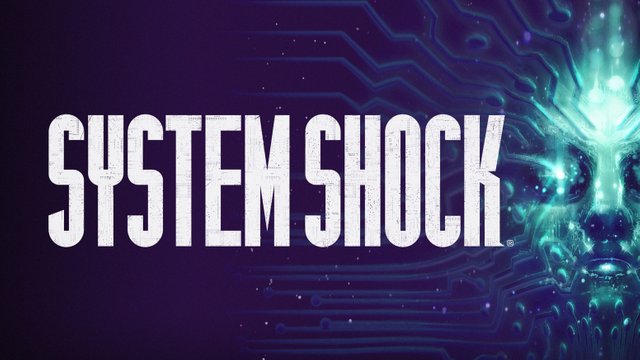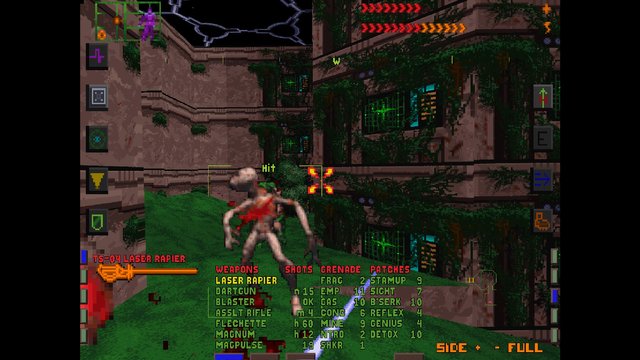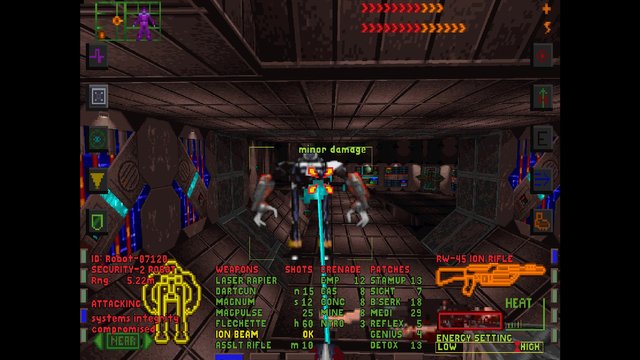Classic Game Review: System Shock
The game which I'm reviewing today is a cult classic, and has inspired some great games of the modern age, known as System Shock (The enhanced edition). System Shock was released for the PC all the way back in 1994, and it is a first person action/role playing game that has uses a cyberpunk theme for the setting. The game was made by Looking Glass Technologies, and then published by a company known as Origin Systems.
This game was very similar to DOOM in a lot of ways, what with it being a sci-fi themed first person shooter that uses pixel 3D graphics. However, it was much more than that thanks to a much richer story and some intricate game mechanics thrown in. Funny enough, most of the time I only hear people talking about it's sequel System Shock 2 though. I find it a bit strange that everyone overlooks this game and never discusses it. Though, this could be blamed on the fact that it was pretty much impossible to play it on modern day systems for quite a few years until the enhanced edition.
Although it had it's issues, mostly with the clunky controls and the difficult user interface, it really set it's place in gaming history by focusing so much on the story and basically created a new genre of action games with stories that had depth. We probably wouldn't even have had games like Resident Evil, The Half Life Series, Silent Hill, Dues Ex, Metal Gear Solid, etc. without this game making the story a key part to the game itself. I'm very glad that Night Dive Studios worked on updating this game to be playable in the modern age, and that I finally had a chance to try this game myself.
The game of System Shock takes place in the somewhat near future of 2072, undetr a cyberpunk setting. The player takes the role on of the protagonist, a nameless hacker. The hacker is caught attempting to break his way into the system of Citadel Station, and is promptly taken away to he station and offered a deal. Hack the artificial intelligence that has control over the station, called SHODAN. As an extra incentive the hacker is offered a military grade neural interface which requires several months of healing after installation.
After hacking SHODAN and removing the ethical constraints on it, you're rewarded for your efforts and put into a healing coma. After time has passed, the hacker finds himself awakening only to find that the staff of the Citadel has been massacred by SHODAN, who has taken over the station and built itself a cyborg army which it plans to use to invade Earth. The hacker finds himself as the last obstacle between SHODAN and the Earth, and will have to travel through the station shooting and hacking his way through an army of enemies to survive.
When you finally start to play the game, you'll get a very quick opening that gives you but a few short text prompts to help you familiarize yourself with the game and environment. A gaudy interface on the screen will welcome you, with a large amount of buttons available for you to use. The controls are also quite different from what we get these days on PC games. The controls for this game act more like a 90's adventure game, with the keyboard controlling only basic movements, with the mouse interacting with the environment of the world.
The weird controls are probably the biggest obstacle for anyone who is new to this game. It's very much at a parallel with DOOM which I mentioned earlier in regards to the controls. With DOOM, everything was very straight forward to use and do. However, with System Shock things are a bit more intricate. The amount of clicking involved to do any kind of task can get to levels of being absurd at times. You'll find something on the ground for example and have to click once to view it, then double click it to put it into your inventory, and then click it another time if you want to add it to your equipped items. This goes on and on in other ways which can get frustrating.
However, some updates have been made with the enhanced edition. Night Dive Studios has added a couple new features which do help somewhat with the clunky controls. These new options added to the game involved implementing the ability of remappable buttons and a toggle mode with your mouse for looking around so you don't have to click to turn anymore.
But, I do have to say, even with these changes the game is probably going to take some getting used to for anyone who is new to playing it. I can only imagine how difficult it was back in 1994 for players to be able to accurately play this game. I would have to guess this was a game which actually required you to read through the user manual before playing, something which we usually just ignore while tossing it in the garbage these days.
Now, having talked about the funky controls being a nuisance at times, I feel that I should say that the controls while not being the best won't actually stop you from progressing. The game takes its time compared to other shooter games of its time like DOOM or Wolfenstein. The slow pace helps quite a bit, and allows for exploring and atmosphere to be more important than the action. The slow pace also allows for strategy to become a part of the action thanks to the encounter rate of enemies being on the lower side. You can expect usually to only encounter one or two enemies at a time, for the most part.
Even when you do find more enemies, you can use those strategies to keep them off your heels. Whether this is by positioning yourself in a defensive measure to passively fight them off, or chucking a grenade into a group of enemies to take care of them in an active way, you'll never feel too overwhelmed. That isn't to say that there's not parts of the game where the pace will pick up and you'll have to deal with some fast action sequences. But, this game definitely puts its story above the action which I think is important.
And, I do mean that. System Shock put it's worldbuilding and atmosphere on a high pedestal which was something fairly new and different for a 90's action game. As you explore the Citadel you'll find bits of information strewn about in all kinds of locations. These pieces of information usually come in the form of emails and data logs that come from the now deceased staff.
This information really helps to paint a picture of what exactly has gone on in the 6 months you've been in a coma, and you'll find some evidence of what you read as you explore. Some of it being unsettling, such as a room covered in mutilated corpses rotting. You'll actually feel that there was once a semblance of normal people living normal lives in this base. It can be creepy and uneasy at times, but really does help build for a nice world in the game.
Now, the atmosphere in the game might not be as good as this games sequel which I consider to be one of the best games made in the 90's, but it still stands out easily. Each location has it's own background music instead of just a single song for the music, or a looped playlist. When coming into an area with enemies the music will abruptly cut out, building up tension of what you're about to come across. Though at times the music can be a bit inconsistent, since you'll be listening to an upbeat action like soundtrack while exploring and looking for clues. It was the 90's though, I suppose.
I do believe that System Shocks most memorable feature however is the gameplay itself. Now, this can be debated whether it's a positive or a negative, but you'll surely not forget it once you try it. Each and every map on the game is a complex network of corridors and chambers, put together in a way where you actually feel like you're traversing through a spacestation. Of course we also have a health, fatigue and energy bar which has a system that is implemented as well.
The combat especially has some complex layers to it with how it behaves, as you'll have things like a stun gun or dart gun which you can use on mutants and living enemies to knock them out, or EMP for the robotic variety. You'll have many types of ammo you can use on your firearms as well, and physical upgrades which you can apply to your character which takes power from your energy bar. There's really a multitude of ways you can customize your character to your liking so you can really play System Shock whichever way you want to.
There's also a really strange type of mode built into this game called Cyberspace mode which injects the hackers consciousness into the digital world. Here your digital avatar floats around exploring grids and other items, and boy can it get confusing in this mode. You'll also be under pressure to complete objectives in a timely matter before SHODAN boots you out back into the real world or sends enemies to fight you while you're still trying to finish your task. I didn't have much fun during these segments of the game, and I'd recommend either lowering the difficulty for these portions or definitely studying the part of the manual involving this feature of the game.
So, in conclusion, System Shock wasn't by any means a perfect game for it's time. It did however offer players something which they hadn't really experienced before with an action game, in that it had a rich story which combined many elements such as horror, worldbuilding, atmosphere and exploration of the world with the action, and created a new entertaining experience. For anyone wanting an interesting classic to play, this could be a game for you so long as you can withstand the weird controls.
Thanks for checking out my review! Hope it's gotten you interested in the game!



Hmm, so a Doom like speedrunner? Well, at least it sounds like it to me. Like a shooter Silent Hill type of game. Nice review :)
You keep gaming, I'll keep upvoting.
Great post thank you for the insight. I'm looking forward to this event great!!!
This post has received a 1.81 % upvote from @booster thanks to: @deadspace.